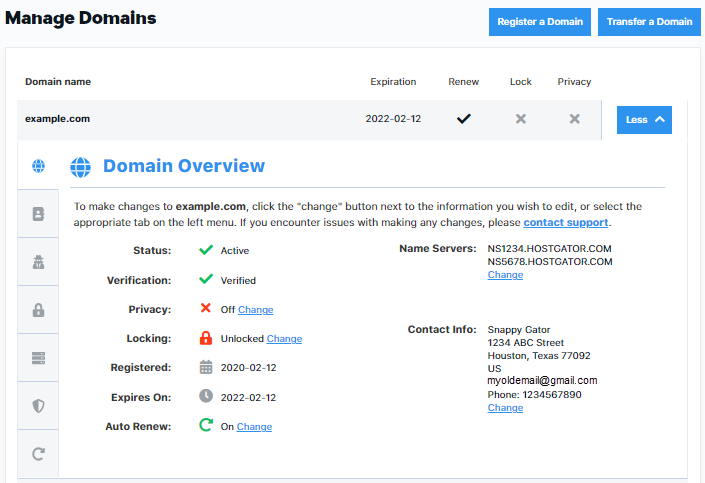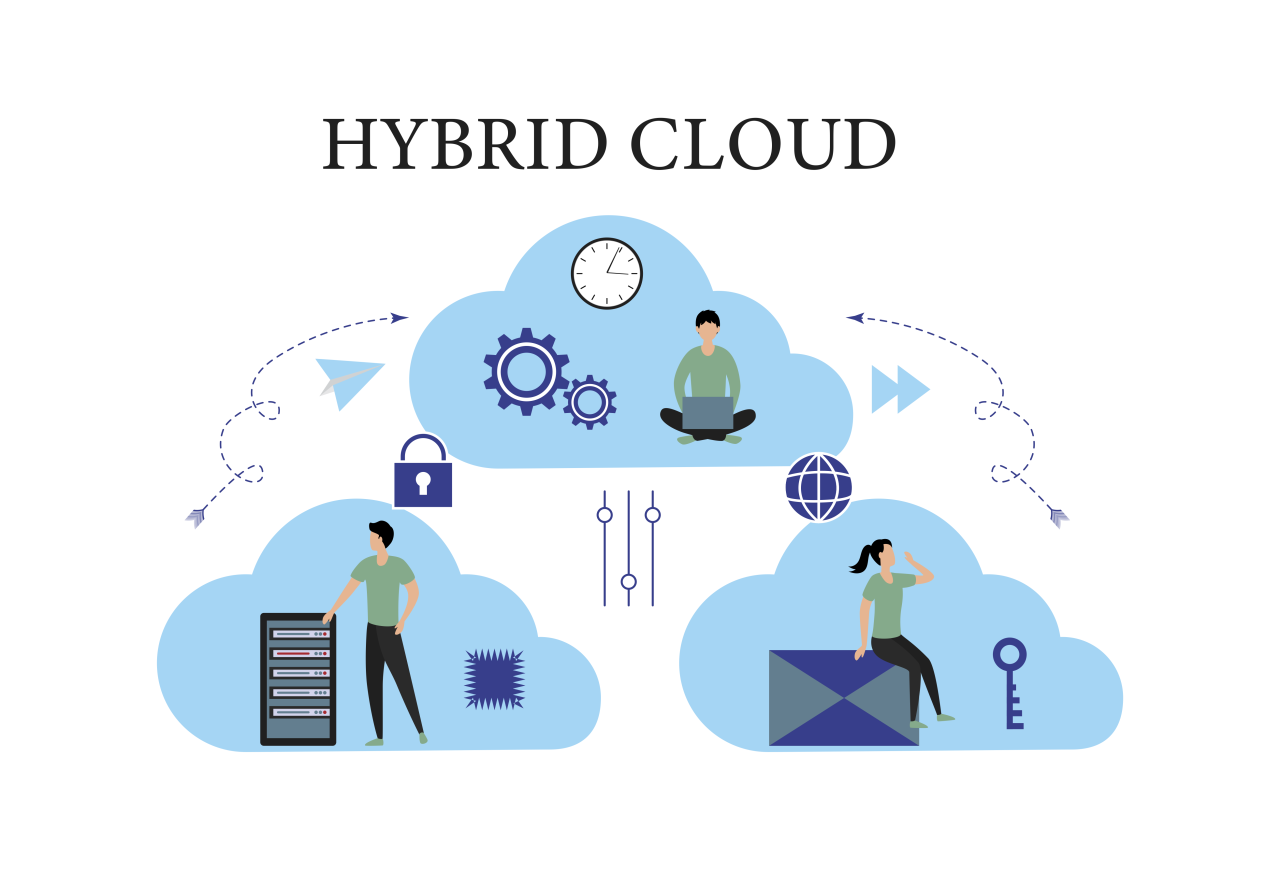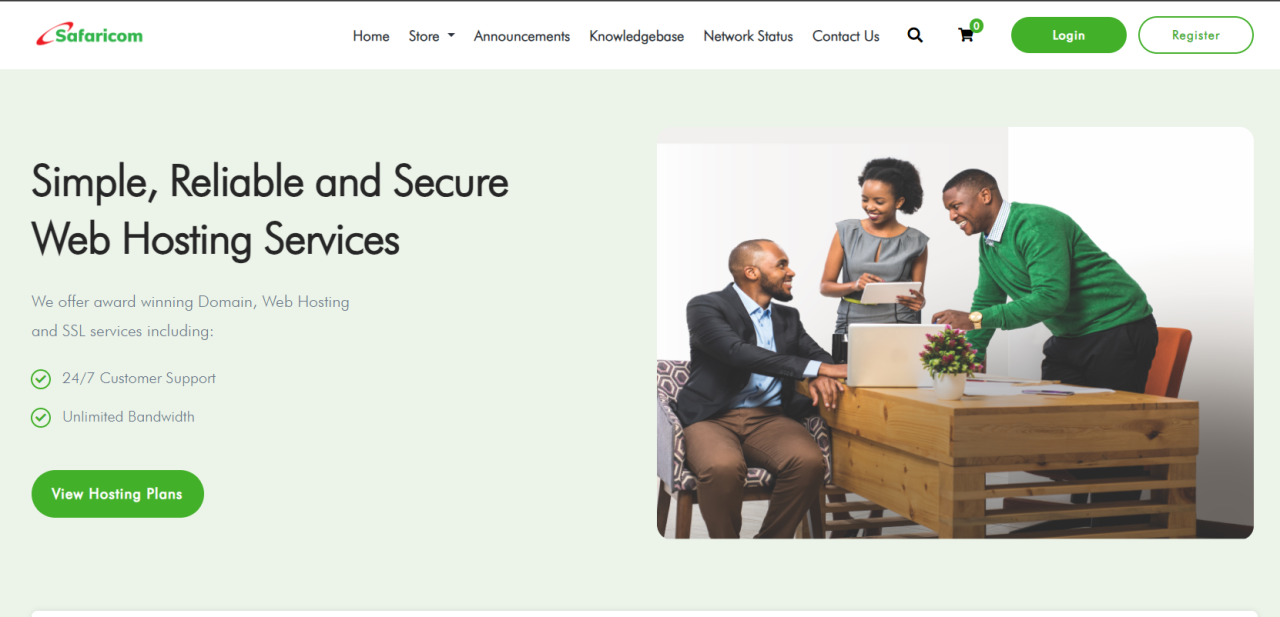Finding the best hosting services for your website is crucial for its success. It’s like choosing the right foundation for your house – if it’s not strong and stable, your website will struggle to perform well. But with so many options available, it can be overwhelming to know where to start. This guide will walk you through the different types of hosting, key features to consider, pricing plans, and more, helping you make an informed decision.
From shared hosting, which is budget-friendly but offers limited resources, to dedicated servers, which provide ultimate control and performance, there’s a hosting solution for every need and budget. We’ll explore the pros and cons of each type, along with essential features like storage space, bandwidth, uptime, security, and more. We’ll also discuss the importance of customer support and reliability, performance and speed, scalability, and data protection.
Types of Hosting Services
Choosing the right hosting service is crucial for any website, as it directly impacts performance, security, and scalability. Different hosting options cater to varying needs and budgets, each with its own set of advantages and disadvantages.
Shared Hosting
Shared hosting is the most affordable option, where multiple websites share the same server resources. This makes it suitable for small websites with low traffic and resource demands.
- Pros:
- Cost-effective
- Easy to set up and manage
- Suitable for beginners
- Cons:
- Performance can be affected by other websites on the server
- Limited resources and control
- Security risks due to shared environment
Examples: HostGator, Bluehost, GoDaddy
VPS Hosting
VPS (Virtual Private Server) hosting offers more resources and control than shared hosting. It provides a virtualized server environment, dedicated to a single user, offering better performance and security.
- Pros:
- Improved performance and reliability
- More resources and control
- Enhanced security
- Cons:
- More expensive than shared hosting
- Requires more technical knowledge
- Limited scalability compared to cloud hosting
Examples: DigitalOcean, Linode, Vultr
Dedicated Hosting
Dedicated hosting provides an entire server dedicated to a single website. This offers maximum performance, security, and control, making it ideal for high-traffic websites and demanding applications.
- Pros:
- Highest performance and reliability
- Complete control over server resources
- Enhanced security and privacy
- Cons:
- Most expensive hosting option
- Requires advanced technical expertise
- Difficult to scale quickly
Examples: Rackspace, OVH, Hostwinds
Cloud Hosting
Cloud hosting utilizes a network of servers to distribute resources and ensure high availability and scalability. It offers flexibility and cost-effectiveness, as you only pay for the resources you use.
- Pros:
- High scalability and flexibility
- Cost-effective based on usage
- Improved performance and reliability
- Cons:
- Can be complex to manage
- Potential security concerns if not configured properly
- May require a learning curve for some users
Examples: AWS, Google Cloud Platform, Microsoft Azure
Managed Hosting
Managed hosting takes care of all server management tasks, including security, updates, and backups. This is a convenient option for businesses that want to focus on their website content and operations.
- Pros:
- Reduced administrative overhead
- Expert server management
- Improved security and performance
- Cons:
- More expensive than self-managed hosting
- Limited control over server configuration
Examples: Kinsta, WP Engine, SiteGround
Key Features to Consider
Choosing the right hosting service is crucial for your website’s success. You need to consider several key features that will directly impact your website’s performance, security, and user experience.
Storage Space
The amount of storage space you need depends on the type and size of your website. If you plan to host a large number of images, videos, or other media files, you’ll need more storage space. A good rule of thumb is to start with a plan that offers at least 10GB of storage space, but you can always upgrade later if needed.
Bandwidth
Bandwidth refers to the amount of data that can be transferred to and from your website in a given time. Websites with a lot of traffic will need more bandwidth. If you’re unsure about your bandwidth requirements, it’s always better to err on the side of caution and choose a plan with a higher bandwidth allowance.
Uptime
Uptime is the percentage of time that your website is available online. A high uptime is essential for any website, but it’s especially important for e-commerce sites and other websites that rely on constant availability. Look for a hosting service that guarantees an uptime of at least 99.9%.
Security
Security is another important factor to consider when choosing a hosting service. Your website should be protected from attacks, such as malware and DDoS attacks. Look for a hosting service that offers security features such as firewalls, intrusion detection systems, and malware scanning.
Customer Support
Finally, you should consider the level of customer support offered by the hosting service. You’ll need to be able to reach customer support quickly and easily if you have any problems with your website. Look for a hosting service that offers 24/7 support via phone, email, or live chat.
Additional Features, Best hosting services
Besides the basic features, there are several other features that you may want to consider, depending on your specific needs. These include:
- Website backups: Regular backups are essential for protecting your website data in case of a disaster. Look for a hosting service that offers automatic backups.
- SSL certificates: An SSL certificate encrypts the data transmitted between your website and your visitors, which helps to protect sensitive information. Most hosting services offer free SSL certificates.
- Domain name registration: Some hosting services offer domain name registration as part of their package. This can be a convenient option if you’re looking to register a new domain name.
- Email accounts: Many hosting services include email accounts as part of their package. This can be a useful feature if you need to create email addresses for your business or personal use.
Pricing and Value
Choosing the right hosting plan involves understanding the pricing structure and assessing the value it offers. Different hosting providers offer various pricing plans, each with its own set of features and resources. To find the best value for your money, you need to carefully analyze the features, resources, and pricing of each plan.
Comparing Pricing Plans
This section compares the pricing plans offered by different hosting providers, highlighting the key features and resources included in each plan.
- Shared Hosting: Shared hosting is the most affordable option, with plans typically starting at a few dollars per month. Shared hosting involves sharing server resources with other websites, which can affect performance.
- VPS Hosting: VPS hosting provides more resources and control than shared hosting, with prices ranging from $10 to $50 per month. VPS hosting allows you to allocate specific resources to your website, resulting in better performance and security.
- Cloud Hosting: Cloud hosting offers scalability and flexibility, with pricing based on usage. Cloud hosting plans typically start at around $10 per month and can go up depending on your needs.
- Dedicated Hosting: Dedicated hosting provides the most resources and control, with prices ranging from $100 to $500 per month. Dedicated hosting gives you exclusive access to a server, ensuring optimal performance and security.
Analyzing Value Proposition
This section analyzes the value proposition of each hosting plan, considering the features and resources included.
- Shared Hosting: Shared hosting is ideal for budget-conscious individuals and small websites with low traffic. It offers basic features and resources at an affordable price.
- VPS Hosting: VPS hosting is a good option for websites with moderate traffic and those requiring more control and performance. It offers a balance between cost and performance.
- Cloud Hosting: Cloud hosting is suitable for websites with fluctuating traffic and those requiring scalability and flexibility. It provides a pay-as-you-go model, allowing you to adjust resources based on your needs.
- Dedicated Hosting: Dedicated hosting is best for high-traffic websites and those demanding maximum performance and security. It provides the highest level of control and resources but comes at a higher price.
Finding the Best Value for Money
To find the best value for money, consider the following tips:
- Compare features and resources: Compare the features and resources offered by different hosting providers. Consider factors such as storage space, bandwidth, database support, and security features.
- Look for discounts and promotions: Many hosting providers offer discounts and promotions for new customers. Take advantage of these offers to save money.
- Read reviews: Read reviews from other users to get an idea of the quality of service provided by different hosting providers.
- Consider your long-term needs: Think about your future needs and choose a hosting plan that can accommodate your growth. If you anticipate your website growing significantly, consider a more scalable hosting option like cloud hosting.
Customer Support and Reliability
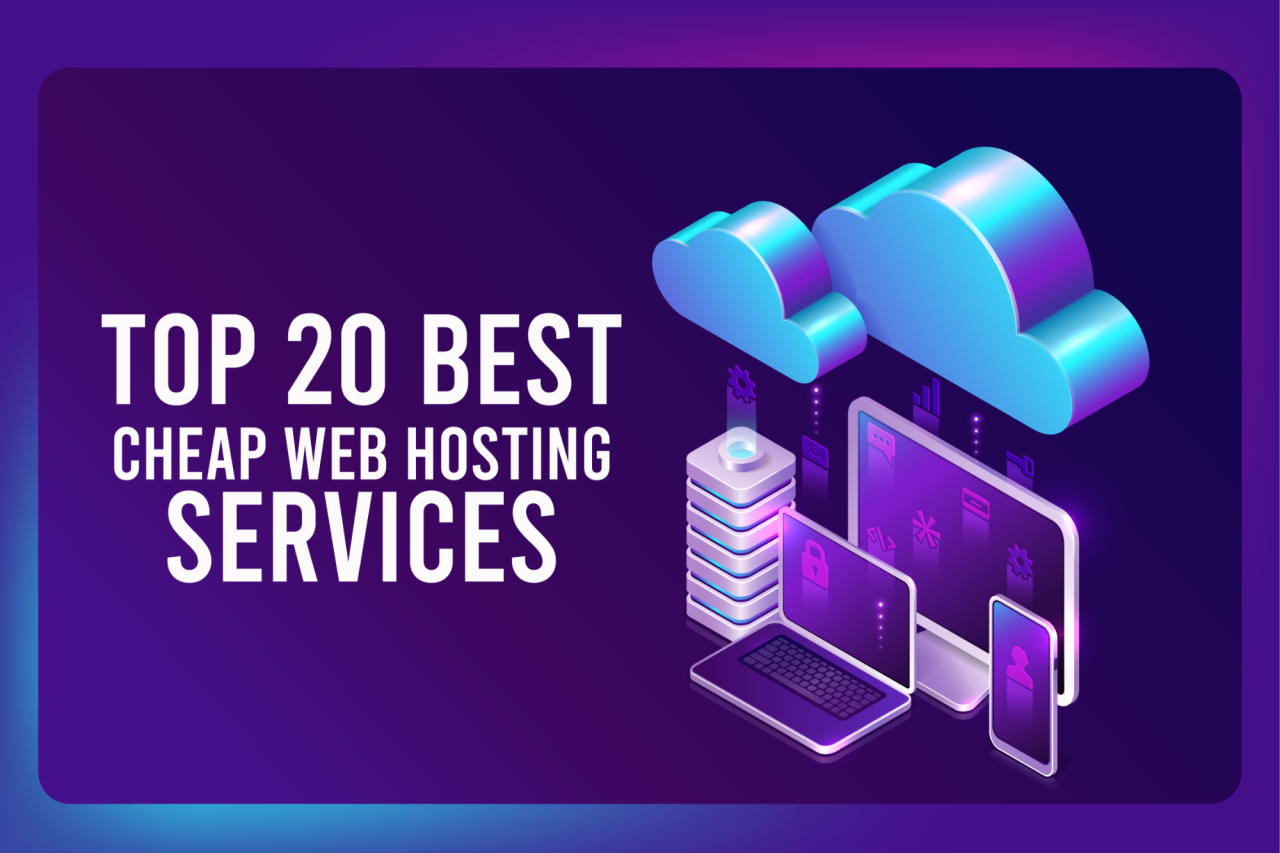
In the realm of web hosting, customer support and reliability are paramount. These factors directly impact your website’s performance, uptime, and overall user experience.
Customer Support Options
Hosting providers offer various customer support channels to cater to different user preferences and needs. Understanding the options available can help you choose a provider that aligns with your support expectations.
- Live Chat: This real-time communication method offers instant assistance, making it ideal for quick inquiries or troubleshooting. Live chat is often available during standard business hours.
- Email Support: Email support is suitable for detailed inquiries or non-urgent issues. Response times can vary depending on the provider’s workload.
- Phone Support: Phone support provides immediate assistance for complex problems or situations requiring direct communication. This option is often available 24/7, especially for premium hosting plans.
- Knowledge Base and FAQs: Many hosting providers offer extensive knowledge bases and frequently asked questions (FAQs) sections on their websites. These resources can help you find answers to common questions or troubleshoot basic issues independently.
- Community Forums: Some hosting providers have active community forums where users can interact with each other and seek support from peers.
Performance and Speed
A website’s performance is critical for user experience and search engine optimization (). A slow-loading website can lead to high bounce rates, frustrated users, and lower rankings in search results. The hosting solution you choose plays a crucial role in determining your website’s speed and performance.
Server Location
The physical location of your web server can significantly impact your website’s loading speed for visitors from different geographical regions. Choosing a server location closer to your target audience minimizes latency, the time it takes for data to travel between the server and the user’s device. For instance, if your website primarily targets users in the United States, selecting a server in the US will generally result in faster loading times for them compared to a server in Europe.
Network Infrastructure
The network infrastructure connecting your server to the internet is equally important. High-quality network infrastructure, such as fiber optic cables, ensures faster data transfer speeds and reduced latency. A robust network with sufficient bandwidth can handle heavy traffic without causing slowdowns.
Caching
Caching is a technique used to store copies of frequently accessed website data on the server or user’s device. This allows the server to deliver content faster by retrieving it from the cache instead of processing the entire request every time. Popular caching methods include:
- Browser Caching: Stores static files like images, CSS, and JavaScript on the user’s device, reducing the need to download them again on subsequent visits.
- Server-Side Caching: Stores dynamic content on the server, minimizing the time required to generate the page on each request.
- Content Delivery Network (CDN): Distributes website content across multiple servers worldwide, delivering it from the nearest location to the user.
Tips for Improving Website Performance
- Choose a Reliable Hosting Provider: Opt for a hosting provider that offers high-performance servers, robust network infrastructure, and caching options.
- Optimize Website Code: Minimize HTTP requests, compress images, and use efficient code libraries to reduce the size of your website files.
- Use a CDN: A CDN can significantly improve loading times, especially for users located far from your server.
- Enable Caching: Utilize browser caching, server-side caching, or both to reduce the load on your server.
- Monitor Website Performance: Regularly monitor your website’s loading speed using tools like Google PageSpeed Insights and Pingdom.
Scalability and Growth
Choosing a hosting provider that can accommodate your website’s growth is crucial for long-term success. As your website gains popularity and attracts more traffic, you’ll need a hosting solution that can handle the increased demand without compromising performance.
Hosting Solutions That Offer Scalable Options
Scalable hosting solutions allow you to adjust your resources as your website’s needs evolve. Here are some common examples:
- Cloud Hosting: Cloud hosting distributes your website across multiple servers, providing flexibility and scalability. If your website experiences a surge in traffic, the cloud infrastructure can automatically allocate additional resources to handle the load. This ensures your website remains accessible and performs well even during peak traffic periods.
- Virtual Private Servers (VPS): VPS hosting offers more control and resources than shared hosting, making it suitable for websites with moderate traffic. VPS providers often offer options to upgrade your server resources as your website grows, providing a gradual path to scalability.
- Dedicated Servers: Dedicated servers provide the highest level of control and resources, making them ideal for large websites with substantial traffic. Dedicated servers offer dedicated hardware and bandwidth, allowing you to customize your server configuration and scale resources according to your specific needs.
Security and Data Protection
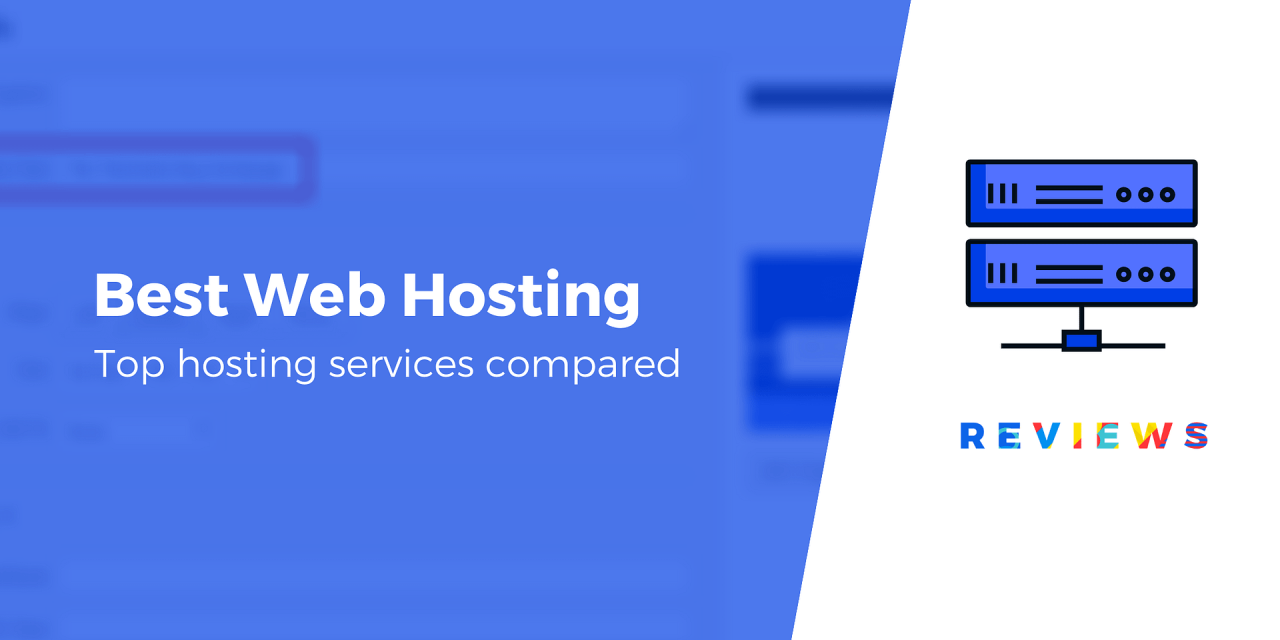
In the digital world, where your website is your online presence, security is paramount. It safeguards your data, protects your reputation, and ensures the smooth operation of your website. A robust hosting service will provide a comprehensive suite of security measures to keep your website and data safe from threats.
Security Features Offered by Hosting Providers
Hosting providers offer a range of security features to protect your website and data. These features can be categorized into several key areas.
Firewall Protection
A firewall acts as a barrier between your website and the outside world, blocking unauthorized access and malicious traffic. It examines incoming and outgoing network traffic, allowing only legitimate requests to pass through. A firewall is a fundamental security measure that helps prevent attacks such as denial-of-service (DoS) attacks and unauthorized access attempts.
Malware Protection
Malware, such as viruses, worms, and Trojan horses, can wreak havoc on your website. Malware protection features scan your website for malicious code and remove it. Some hosting providers offer real-time malware scanning and removal, ensuring your website is always protected.
SSL Certificates
An SSL certificate encrypts the communication between your website and visitors, ensuring that sensitive information, such as credit card details or login credentials, is transmitted securely. This is crucial for e-commerce websites and any website that handles sensitive data. SSL certificates also build trust with visitors, as they see the “https” prefix in the address bar and a padlock icon, indicating a secure connection.
Regular Security Updates
Hosting providers are responsible for keeping their servers and software up to date with the latest security patches. Regular security updates fix vulnerabilities and weaknesses that could be exploited by attackers. This ensures that your website is protected against the latest threats.
Data Backups and Disaster Recovery
Data backups are essential for protecting your website data against accidental deletion, hardware failures, or cyberattacks. Hosting providers offer various backup solutions, including daily, weekly, or monthly backups. They also provide disaster recovery plans, which Artikel procedures for restoring your website in the event of a disaster.
Ease of Use and Management
Website hosting should be as easy to use and manage as possible, especially if you’re a beginner. Imagine having a website that’s easy to set up and maintain without needing a degree in computer science. That’s the power of user-friendly hosting platforms. They empower you to focus on your website content and growth, not on technical complexities.
Control Panel Interface
A user-friendly control panel is essential for seamless website management. It acts as the central hub for all your hosting-related tasks, such as managing files, installing applications, configuring databases, and monitoring website performance. Think of it as the cockpit of your website. A well-designed control panel should be intuitive, offering easy access to essential features and clear instructions.
- cPanel: A popular and widely used control panel known for its comprehensive features and intuitive interface. It’s a favorite among many web hosting providers, offering a user-friendly experience for managing domains, email accounts, databases, and more. Its graphical interface makes it easy to navigate and perform common tasks.
- Plesk: Another popular control panel known for its powerful features and flexible configuration options. It offers a user-friendly interface that’s suitable for both beginners and experienced users. Plesk excels in managing multiple websites and domains, making it ideal for web agencies and businesses with complex hosting needs.
- DirectAdmin: A lightweight and efficient control panel that’s known for its simplicity and ease of use. It’s a good choice for users who prefer a streamlined interface without sacrificing essential features. DirectAdmin is a solid option for those who want a quick and straightforward experience.
Website Management Tools
Beyond the control panel, a good hosting provider offers a suite of website management tools to simplify various aspects of your website’s operation. These tools can save you time and effort while enhancing your website’s performance and security.
- Website Builders: For those who lack coding knowledge, website builders offer drag-and-drop interfaces to create professional-looking websites without writing a single line of code. These tools are user-friendly and allow you to customize your website’s design, add content, and manage your site with ease.
- One-Click Installers: These tools simplify the process of installing popular software applications, such as WordPress, Joomla, Drupal, and more. With a few clicks, you can set up your website platform and start building your online presence. They streamline the installation process and eliminate the need for manual configurations.
- Security Features: A robust hosting provider offers a range of security features to protect your website from threats. These include firewalls, malware scanners, spam filters, and SSL certificates, ensuring the safety and integrity of your website and data.
Tips for Effective Website Management
- Choose a Hosting Provider with a User-Friendly Interface: Start by selecting a hosting provider that offers a user-friendly control panel and website management tools. This will make managing your website a breeze, even if you’re not a technical expert.
- Take Advantage of One-Click Installers: Leverage one-click installers to quickly and easily set up popular website platforms like WordPress. This saves you time and eliminates the need for manual configurations.
- Back Up Your Website Regularly: Regular backups are crucial for protecting your website from data loss. Ensure your hosting provider offers automatic backups or provides you with the tools to create your own backups.
- Monitor Your Website’s Performance: Keep an eye on your website’s performance metrics, such as loading speed and uptime. A good hosting provider offers tools to monitor these metrics and provide insights into your website’s health.
Popular Hosting Providers
Choosing the right hosting provider can be a daunting task, with countless options available. This section will provide a comprehensive overview of popular hosting providers, their key features, pricing plans, and target audiences.
Popular Hosting Providers
| Provider | Key Features | Pricing Plans | Target Audience |
|---|---|---|---|
| Bluehost | Shared, VPS, Dedicated, WordPress hosting; free domain name; cPanel control panel; 24/7 customer support | Shared hosting starts at $2.95/month; VPS hosting starts at $19.99/month; Dedicated hosting starts at $79.99/month | Individuals, small businesses, bloggers, and WordPress users |
| HostGator | Shared, VPS, Dedicated, Cloud, WordPress hosting; free domain name; cPanel control panel; 24/7 customer support | Shared hosting starts at $2.75/month; VPS hosting starts at $19.95/month; Dedicated hosting starts at $89.98/month | Individuals, small businesses, bloggers, and WordPress users |
| GoDaddy | Shared, VPS, Dedicated, Cloud, WordPress hosting; free domain name; cPanel control panel; 24/7 customer support | Shared hosting starts at $5.99/month; VPS hosting starts at $19.99/month; Dedicated hosting starts at $119.99/month | Individuals, small businesses, bloggers, and WordPress users |
| SiteGround | Shared, VPS, Cloud, WordPress hosting; free domain name; cPanel control panel; 24/7 customer support | Shared hosting starts at $6.99/month; VPS hosting starts at $29.95/month; Cloud hosting starts at $80/month | Individuals, small businesses, bloggers, and WordPress users |
| DreamHost | Shared, VPS, Dedicated, Cloud, WordPress hosting; free domain name; cPanel control panel; 24/7 customer support | Shared hosting starts at $2.59/month; VPS hosting starts at $10.00/month; Dedicated hosting starts at $149.00/month | Individuals, small businesses, bloggers, and WordPress users |
| A2 Hosting | Shared, VPS, Dedicated, Reseller, WordPress hosting; free domain name; cPanel control panel; 24/7 customer support | Shared hosting starts at $3.92/month; VPS hosting starts at $25.00/month; Dedicated hosting starts at $99.00/month | Individuals, small businesses, bloggers, and WordPress users |
| Namecheap | Shared, VPS, Dedicated, Reseller, WordPress hosting; free domain name; cPanel control panel; 24/7 customer support | Shared hosting starts at $2.88/month; VPS hosting starts at $14.88/month; Dedicated hosting starts at $88.88/month | Individuals, small businesses, bloggers, and WordPress users |
| InMotion Hosting | Shared, VPS, Dedicated, Reseller, WordPress hosting; free domain name; cPanel control panel; 24/7 customer support | Shared hosting starts at $3.99/month; VPS hosting starts at $19.99/month; Dedicated hosting starts at $149.99/month | Individuals, small businesses, bloggers, and WordPress users |
| Cloudways | Cloud hosting platform; managed servers; multiple cloud providers (DigitalOcean, AWS, Google Cloud, Linode, Vultr); 24/7 customer support | Pricing varies based on server size, cloud provider, and location | Developers, agencies, and businesses with high-traffic websites |
| Kinsta | Managed WordPress hosting; Google Cloud platform; free domain name; 24/7 customer support | Pricing starts at $30/month; plans vary based on website traffic and resources | WordPress users, businesses, and agencies |
Conclusive Thoughts: Best Hosting Services
Choosing the right hosting service is a key step in building a successful online presence. By understanding the different types of hosting, key features to consider, and the importance of reliability, security, and performance, you can make an informed decision that will help your website thrive. Remember, investing in a good hosting provider is an investment in your website’s future.
Choosing the best hosting service for your needs can be tricky, but it’s essential for a smooth and reliable website experience. If you’re working with a database-heavy application, you might want to consider a provider that offers support for sql server 2019 express.
This powerful database management system is known for its scalability and performance, making it a good choice for demanding websites. When researching hosting options, be sure to factor in your specific requirements and budget to find the best fit for your project.

